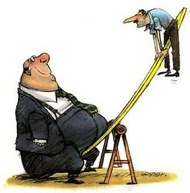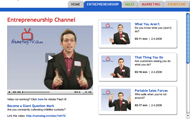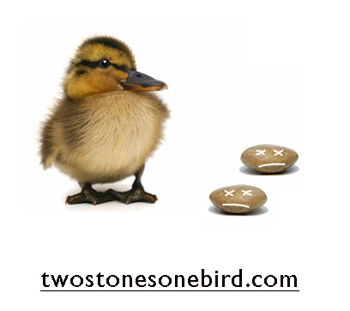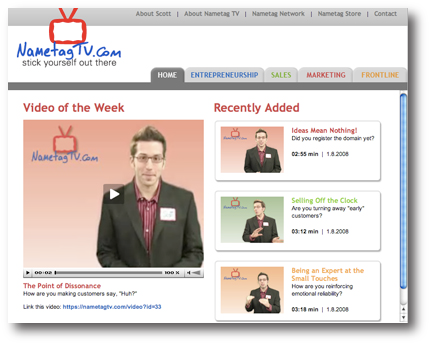 You don’t need an idea – you need an I did.
You don’t need an idea – you need an I did.
That’s how you close the execution gap. That’s how you covert thoughts into things. And that’s how you covert experiences into moneymaking wisdom.
As such, leverage must become an essential component to your entrepreneurship lexicon. The word means, “To increase the rate of return from an investment.”
But leverage isn’t a word. Or a strategy. Or something you do to make money.
Leverage is a lifestyle. A way of thinking. An approach to doing business. Take it from a guy with no background, no job experience and no credentials – who turned a simple idea like wearing a nametag everyday into a successful enterprise. Twelve books later, if that’s not leverage, I don’t know what is.
Today we’re going to explore a series of leverage questions to help you kill two stones with one bird.1. If everything you’ve done up until now is just the beginning, what’s next? Past is prologue. Past brought you here. Past made you who you are. When you start to align your thinking with this truth, a new world of possibilities opens up. Your challenge is to extend gratitude for – and embrace the value of – everything you’ve already accomplished.
At the same time, don’t overvalue prior successes. Arrogance of the past will come back to bite you in the ass. As John Mayer explained during an interview with Esquire, “To evolve, you have to dismantle. And that means accepting the idea that nothing you created in the past matters anymore other than it brought you here. You pick up your new marching orders and get to work.” Will you view the past as a crutch or a fulcrum?
2. What will you do differently next time? Kaizen is the Japanese term for continuous improvement. That’s exactly what this question is all about: Honoring your current performance, yet challenging yourself to envision an enhanced future.
In my first five years as a professional speaker, I employed this philosophy as a post-speech ritual. Once my presentation was over, I’d take fifteen minutes to write a stream of consciousness list. Every thought, every feeling and every evaluation of my performance, I wrote down.
What worked? What didn’t work? What killed? What bombed?
This simple ritual grew into a profitable practice for continuous improvement of my performance as a speaker. How could you apply the same reflection process to your job performance?
3. What’s next? My readers and audience members frequently ask me, “Hey Scott, which of your books is your favorite?” And after eight years, the answer has always been the same: “My next one.” I challenge you to embrace that same attitude of “What’s next?” in your work.
First, on a micro level. That is, in terms of productivity. Ask yourself this question throughout the day to resurrect declining momentum. Secondly, on a macro level. That is, in terms of productivity. Ask yourself this question throughout your creative process to ensure consistent execution. What is your legacy of taking action?
4. What’s next? Does this new thing allow you to command higher fees than before? Does this new thing allow you to learn new skills? Does this thing enable you to leverage more than in the past? Does this new thing expose you an important future opportunity? Does this new thing increase (not just sustain) an existing relationship?
Does this new thing lead to future work with the same organization? Does this new thing lead you into a new industry? Does this new thing represent an organization you would hate to lose? Does this new thing represent long-term business potential? Does this serve as a reference or exemplar for other clients? What’s your system for predicting potential?
5. How can I make this idea last forever? Anchor your expertise in that which is timeless. Democratize and genericize your thoughts so they outlast you. Always be on the lookout for ways to increase the shelf life of your material. Ask questions like:
*Is this a fad, a trend or an evergreen?
*In five years, will this idea still be irrelevant?
*What is a bigger, more stable theory of the universe that I can attach this idea to?
Remember: If you’re not current, you’re not credible. Remember to run your expertise through the wringer of when. Stabilize your content. Are you timeless?
6. How does this fit into your theory of the universe? Your expertise is a filter. And the challenge is to bring ideas from one field of knowledge into another field of knowledge. You have to observe your encounters objectively by asking, “What’s the key idea here, regardless of the context?”
Other variations of this question are: “What does this have to do with me?” “How does this have to do with my expertise?” “How is this a symbol or example of my expertise?” “How could I use this as an example in my work?” Make connections between seemingly unconnected things. What’s your philosophy of the world?
7. What else can be made from this? The key to leverage is to look at something you’ve created and then play with its potential. It’s called “Movement Value.” For example, if you’ve been posting on your blog every day for a year, could you combine those writings into a book?
Or, if you have a stack of pictures sent in from various customers over the years, what if you created a “Meet Our Clients” slide show and posted it online? Accumulation is equity. How much do you have?
REMEMBER: Ideas are free; execution is priceless.
If you want to make a name for yourself – and make a bank account for yourself – ask yourself these leverage questions to kill two stones with one bird.
LET ME ASK YA THIS…
What are you leveraging?
LET ME SUGGEST THIS…
For the list called, “7 Ways to Out Experience the Competition,” send an email to me, and you win the list for free!
* * * *
Scott Ginsberg
That Guy with the Nametag
Author, Speaker, Entrepreneur, Mentor
[email protected]
Tune in to The Entrepreneur Channel on NametagTV.com.
Watch video lessons on executing what matters.



 Come to the
Come to the 
